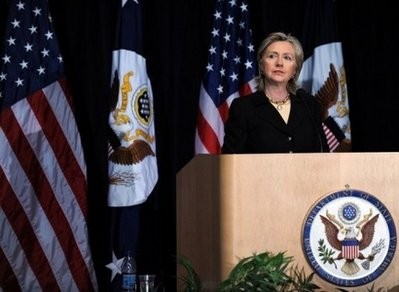MOSCOW (AFP) – US Secretary of State Hillary Clinton visited Russia Thursday in a bid to accelerate progress towards a new accord between the Cold War foes to drastically reduce their nuclear arsenals.

Clinton was to hold talks with her Russian counterpart Sergei Lavrov set to focus strongly on the increasingly protracted process of agreeing a successor to the 1991 Strategic Arms Reduction Treaty (START) which expired in December.
Negotiators failed to agree a successor by the end-2009 target agreed by US President Barack Obama and Russia's Dmitry Medvedev and the issue risks becoming an embarrassment to the "reset" in ties if not settled soon.
While some media reports have said the search for a new treaty has been stymied by major policy differences between the United States and Russia, officials have insisted only technical issues remain to be ironed out.
The United States and Russia were "getting closer" to agreement on the new nuclear disarmament treaty, top State Department official William Burns told reporters accompanying Clinton.
Lavrov for his part said he had "seen no sign of something not going well."
"All the 'i's have been dotted and all that remains is diplomatic-technical work... This will take some time but is purely technical," he said while returning from a visit to Turkmenistan, according to Russian news agencies.
Related article:Obama says no crisis in US-Israel relations
Clinton will also meet Medvedev though it remains unclear whether she will encounter Prime Minister Vladimir Putin, seen by most as still Russia's de-facto number one.
Progress on a new nuclear treaty would provide Medvedev and Barack Obama with much-needed proof they have succeeded in improving relations after ties became mired in distrust under ex-president George W. Bush.
The Russian media has reported that the two presidents would like to sign the final agreement in an Eastern European capital before the United States hosts a nuclear security summit from April 12-13.
But The New York Times reported last week that talks had hit a hitch, saying Obama was frustrated that Medvedev was linking the disarmament treaty with a dispute on US plans to install missile defence facilities in Eastern Europe.
Moscow was especially angered by an announcement in January that Romania would host elements of a US missile shield, The New York Times said.
The staunchly pro-Kremlin speaker of the Russian parliament, Boris Gryzlov, said this week his MPs would not approve any new disarmament accord unless it made a link with missile defence.
But Lavrov said: "You do not have to worry. There will be a link."
Obama and Medvedev in July agreed the new treaty should slash the number of warheads on either side to between 1,500 and 1,675. The United States currently has some 2,200 nuclear warheads, while Russia is believed to have about 3,000.
The official reason for Clinton's two-day visit is a meeting of the Middle East diplomatic quartet, a gathering that has grown in importance after Israel announced the construction of 1,600 new settler homes in annexed East Jerusalem.
Clinton and Lavrov will meet with the other representatives of the quartet, EU foreign policy chief Catherine Ashton and UN Secretary General Ban Ki-moon for dinner Thursday ahead of longer talks on Friday.
The Israeli announcement led the Palestinians to call for a halt to peace talks and precipitated the worst crisis in US-Israeli relations in years, with senior US officials warning the plans jeopardized the peace process.
Washington was also piqued by the announcement's timing -- coming as US Vice President Joe Biden visited the region -- and analysts said that the quartet could be expected to ramp up the pressure on Israel over the issue.
Clinton will also be looking for clear signs Russia could be prepared to back tough sanctions on Iran if the stalemate continues over Tehran's nuclear programme.
























